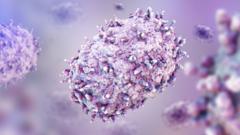With 3,623 suspected Cholera cases and 103 deaths recorded across 34 states and the Federal Capital Territory as of July 15, 2024, thisoutbreak has put significant strain on Nigeria’s healthcare system, highlighting the urgent need for long-term measures to improve water and sanitation infrastructure and educate the populace about hygiene practices. Chiemelie Ezeobi writes that this has also made the ongoing efforts by the Private Sector Health Alliance of Nigeria (PSHAN) to revitalise primary healthcare centres across Nigeria’s 774 Local Government Areas, increasingly crucial
Nigeria is currently in the grip of a severe cholera outbreak, a crisis that has already claimed 40 lives and is spreading rapidly across multiple states. A highly infectious disease, cholera poses a grave threat to public health, particularly in areas with poor sanitation and limited access to clean water.
This acute diarrheal illness is characterised by the sudden onset of profuse watery diarrhoea, which can lead to severe dehydration and, if untreated, death.
The causative agent, a bacterium called Vibrio cholerae, is typically found in areas with poor sanitation, making cholera outbreaks common in areas with inadequate sewage treatment and unclean drinking water. Most individuals get infected when they take water or other food substances contaminated with faeces from an infected person. The World Health Organization (WHO) estimates that cholera affects 1.3 to 4 million people worldwide annually, resulting in up to 143,000 deaths.
Cholera manifests very rapidly, with symptoms appearing between 12 hours and five days after ingestion of the contaminated substance. Without prompt and adequate treatment, the illness can lead to shock and death within hours. However, proper rehydration can reduce the mortality rate to less than 1%, offering hope in the face of this deadly disease.
Primary Symptoms
Primary symptoms to watch out for include Severe watery diarrhoea: Often described as “rice-water stools” due to its appearance; Vomiting: This leads to further loss of fluids and electrolytes; Leg cramps: Due to severe dehydration and electrolyte imbalances; and Rapid heart rate: A sign of severe dehydration.
Cornerstone of Treatment
The cornerstone of cholera treatment is rapid rehydration. Oral Rehydration Salts (ORS) are highly effective in replacing lost fluids and electrolytes. In severe cases, intravenous fluids may be necessary. Antibiotics can shorten the duration of diarrhoea and reduce the volume of rehydration fluids needed.
Zinc supplementation is also beneficial, particularly for children, as it helps reduce the duration and severity of diarrhoea. For treatment to be effective, it must be administered promptly. Community health workers and volunteers are crucial in identifying early cases and ensuring patients receive the necessary care.
Current Situation in Nigeria
As of Thursday, June 27, 2024, the Nigeria Centre for Disease Control and Prevention has reported 1,141 suspected cholera cases across 30 states. Among these, 65 cases were confirmed, resulting in 30 deaths across 96 local government areas within these states.
Lagos, Nigeria’s most populous city, has been hit the hardest, with 79 suspected cases, 43 laboratory-confirmed cases, and 29 cholera-related deaths, according to the state Commissioner for Health, Prof Akin Abayomi.
As at July 15, 2024, the Nigeria Centre for Disease Control and Prevention, said it has recorded 3,623 suspected Cholera cases and 103 deaths across 34 states and the Federal Capital Territory.
Even though there has been a 5.6 per cent decline in the number of cases between July 8 to 14, 2024, (8th -14th July) as compared to the preceding week, the Director General of the NCDC, Dr. Jide Idris, said the current outbreak had spread to 187 local government areas, with a cumulative case fatality rate of 2.8 per cent since the beginning of the year with the predominant age affected being five years old, while males account for 52 per cent of cases and females account for the rest.
Efforts by PSHAN to Revitalise PHCs
This outbreak has put a significant strain on Nigeria’s healthcare system, highlighting the urgent need for long-term measures to improve water and sanitation infrastructure and educate the populace about hygiene practices.
In light of this, the ongoing efforts by the Private Sector Health Alliance of Nigeria (PSHAN) to revitalise primary healthcare centres across Nigeria’s 774 Local Government Areas (LGAs) have become increasingly crucial.
PSHAN, a leading private sector platform for health in Nigeria, is playing a significant role in strengthening primary healthcare infrastructure, which lays the groundwork for better disease prevention, early detection, and effective response to outbreaks.
With robust primary healthcare systems in place, communities are better equipped to handle outbreaks through Early Detection and Treatment: Effective primary healthcare allows for the swift identification of cholera cases, enabling prompt treatment and reducing the risk of severe dehydration and death; Community Education and Engagement: Primary healthcare centres can serve as hubs for disseminating vital information on hygiene practices, safe water use, the importance of seeking medical care early, etc., to locals, which can significantly reduce the spread of cholera; and Preventive Measures: Strong primary healthcare systems support vaccination campaigns and other preventive measures, such as distributing water purification tablets and promoting good sanitation practices. General preventive measures include access to clean water, proper sanitation facilities, handwashing with soap, safe food preparation, proper waste disposal, and vaccination.
As the country battles the current cholera outbreak, the importance of organisations like the Private Sector Health Alliance of Nigeria (PSHAN) in strengthening primary healthcare cannot be overstated.
Through the Adopt-a-Healthcare Facility Programme (ADHFP), PSHAN is committed to pooling private sector expertise, resources and funds revitalise and expand Primary Healthcare Centres (PHCs) throughout Nigeria, making world-class healthcare accessible to every Nigerian.
ADHFP aims to establish PHCs across Nigeria’s 774 Local Government Areas, implementing market-based reforms to provide affordable, quality healthcare to the poor and vulnerable. This initiative will ensure better health outcomes for all Nigerians.
Driven by the conviction that Africa will continue to bear the burden of high disease mortality unless we address the poor state of primary healthcare centres, ADHFP is a crucial step towards improving foundational health services.
PSHAN believes that the future of Nigeria’s health depends on our collective commitment to enhancing these services, noting that “Together, we can significantly impact the fight against cholera and strengthen primary healthcare in Nigeria”.
Discover more from HOT SOURCE NEWS
Subscribe to get the latest posts sent to your email.



